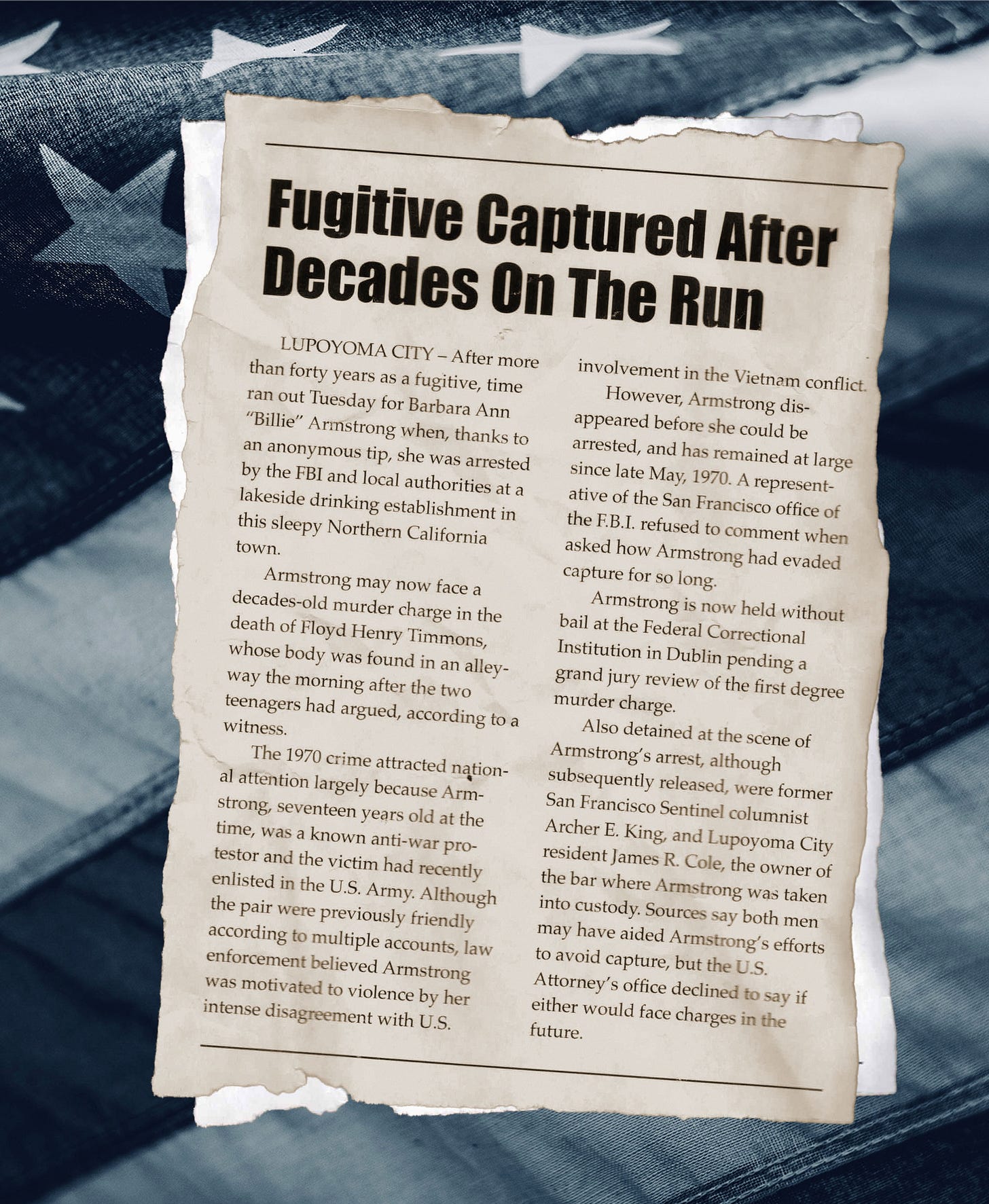The Blues & Billie Armstrong 65
THE TRUTH AMONG MEN
Previously in The Blues & Billie Armstrong…
“Fuck you, fuck you, and fuck you!” she said, and jabbed her index finger close to my face with rhythm. I looked up and saw mascara pouring down her cheeks. The metal door buzzed and clunked and swung open, Officer Gonzales filled the doorway.
Valentine did not say another word to me as Gonzales escorted us out of the building.
In the parking lot, she retrieved her purse from my car, pulled out her phone and immediately called a taxi. I waited to make sure her ride showed, then I crawled into The City in the Cadillac along with rush hour traffic and the late afternoon sun.
Game five of the National League Championship Series was already a couple innings old when I hit the freeway. The Giants had a chance to punch their ticket to the World Series with a win, but it was not to be. During the season, broadcaster Duane Kuiper, had dubbed the team’s style of play “torture baseball” because of their many late-inning nail-biter wins and some frustrating losses of the same character.
The moniker stuck and the team maintained that M.O. right down to the final day of the season. They were following the same pattern in the NLCS, missing the opportunity to finish it off at home. Now, after a four-two loss, they would head to Philadelphia, where getting that last win would likely be much tougher. It all seemed so fitting.
I got to my house, parked the Caddy in the garage, stopped in the foyer to check my mailbox. Four or five days of shreddables crammed in there. I felt a tingling fatigue like an opiate come-on as I plodded up the stairs. I got through the door and went for the bourbon, first things first. I wasn’t hungry. I wasn’t sleepy or sad or angry or even afraid. I was rumpled outside, wrung out inside and some new kind of numb all over. I described this to myself as the peace of surrender.
I walked my glass of Maker’s over to the stereo and pushed play, starting with something blue and familiar. The Best of Little Walter, which opens with the jaunty My Babe, followed by Sad Hours, that wonderful wordless conversation between Little Walter on the harp and Muddy Waters on guitar that brings to mind shadowy images of two men drinking after hours, talking regret at a wrongside bar. And still takes me back to the dayroom.
I sat in one of the leather recliners by the big bay window with my glass close-by on a side table, and I stared out across the street to Golden Gate Park where the glow of the westering sun lit up the tops of the eucalyptus trees like candles against the dusk.
The doorbell buzzed, and I really didn’t want to get up, but I thought it might be Valentine. It turned out to be Tom Monihan. He came in rubbing his shaved head like he does when things get awkward. He said he didn’t expect me to be home, said he’d left a shit-ton of messages on my phone and where the hell was I the last five days.
“I thought I might be leaving this outside your door,” he said, and he handed me a cardboard filebox full of the personal stuff from my office.
“So, I’m fired?”
“Missed the deadline, no story, no show, no call. That’s fired in my book.”
“I’m sure Lockhart wouldn’t have it any other way.”
He nodded confirmation, and I offered him a drink. We sat in the matching recliners looking out the bay window at the twilight falling on the street and the park. I told him the story of the five days since I’d left San Francisco to interview Billie. I told him the truth. About the five days.
I poured us both another drink. Then I told him the rest—that I had killed Hank Timmons with the baseball bat after Billie had smacked him in the head and escaped from the alley. I was practicing saying it out loud, relating the factual details in order— he did this, she did that, I did something else. I realized I was implicitly asking for editorial advice, but he offered none.
Monihan was my oldest and closest friend. Perhaps my only friend. We’d spent a lot of time together over the years, checked off all the boxes on the male bonding questionnaire. Camping, carousing, road trips, hangovers, romantic triangles, bail money, every etcetera in the book. His reaction was stone-cold x-ray vision. “Long time to live with such a hard secret. That probably explains why you’re so fucking tough on the world. And yourself.”
“I made a lot of wrong calls,” I said.
“You were just a kid,” Monihan said. “And he had it coming.”
“Doesn’t change a thing,” I said. “A man has to look life in the eye. Right?”
Monihan rubbed his bristly head. “You gonna tell the whole thing to the grand jury?”
“I don’t know, man. I hope I can.”
Across the street the eucalyptus trees were turning into black silhouettes against the purple nightfall.
On his way out the door, Monihan pointed at the cardboard filebox. “There’s an envelope with your severance check,” he said. “And the Armstrong story we ended up running, if you’re interested.”
I rummaged around in the box a bit. There wasn’t much in there: the two-volume Oxford English Dictionary that Robyn gave me when I left for college, a baseball signed by Willie Mays, a framed photo taken the night I jammed blues harp with the great Buddy Guy in Chicago, assorted books and papers, and the engraved plaque the Sentinel gave me to celebrate the Pulitzer.
The severance was decent—more than my contract called for. Probably a bad PR move to dump a prize-winning loudmouth writer and not throw in some go-away-quietly bucks. Of course, when Lockhart signed the check he didn’t know I would be at the federal courthouse the next day. He only knew I’d managed to cost him a bucket of ad revenue and some brown-nosed phone calls.
A newspaper, or rather a section of a newspaper, had been quarter-folded and slid in between some books. I pulled it out and saw the headline. “Fugitive Captured After Decades On The Run.” Dateline: Lupoyoma City.
Most of the piece read like standard wire copy—straight, boilerplate skimming material. “After more than forty years as a fugitive, time ran out Tuesday for Barbara Ann ‘Billie’ Armstrong… anonymous tip… arrested by the FBI and local authorities…The 1970 crime attracted national attention… known anti-war protestor… The victim had enlisted in the U.S. Army… Armstrong is now held without bail… grand jury review… first degree murder charge…” Blah blah de blah.
But the final paragraph hit like a punch in the face.
“Also detained at the scene of Armstrong’s arrest, although subsequently released, were former San Francisco Sentinel columnist Archer E. King, and Lupoyoma City resident James R. (AKA ‘Sonny’) Cole, the owner of the bar where Armstrong was taken into custody. Sources say both men may have aided Armstrong’s efforts to avoid capture, but the U.S. Attorney’s office declined to say if either would face charges in the future.”
I laid the newspaper down next to my drink on the side table and buried my face in my hands.
“I should have known,” I said out loud to no one. Turned my face up to the ceiling, laughed at the muddy convoluted truth.
The Blues & Billie Armstrong is a work of fiction. Names, characters, businesses, places, events and incidents in this book are either the product of the author's imagination or used in a fictitious manner. Any resemblance of the fictional characters to actual persons, living or dead, is purely coincidental.
© All Rights Reserved



